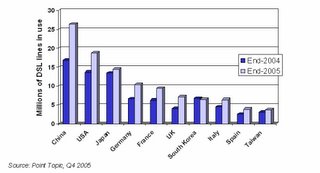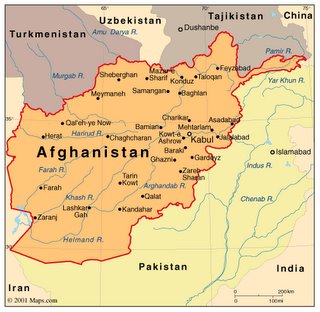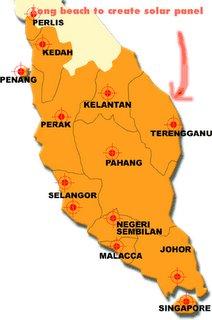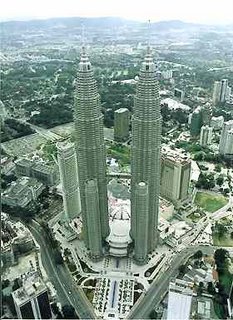Read more...
Friday, March 31, 2006
Power-strip with hidden GSM phone-hardware
Read more...
Jill Carroll Released
"We can confirm that she has been released," said Scott Peterson, a correspondent for the paper in Baghdad. He offered no information about the circumstances of her release or her well-being.
Ms. Carroll, 28, was abducted Jan. 7 in western Baghdad and appeared in three videotapes released by her captors. The kidnappers issued a statement through a Kuwaiti television station in February demanding that the Americans and Iraqis release all imprisoned women by Feb. 26 or she would be killed. That date passed without the governments’ compliance, and there was no further word of Ms. Carroll.
On Feb. 28, Iraq’s interior minister told ABC News that the kidnapped American reporter Jill Carroll was still alive and that he knew who had kidnapped her and believed she would be released soon.
Ms. Carroll was kidnapped less than 300 yards from the office of Adnan Dulaimy, a prominent Sunni Arab politician, whom Ms. Carroll had been intending to interview that morning. Her interpreter, Allan Enwiyah, 32, was shot dead at the scene.
In an interview with The New York Times on Wednesday, Mr. Dulaimy repeatedly expressed his concerns about Ms. Carroll. In recent months, he made public appeals for her release.
Though many other Americans have been kidnapped in Iraq since the invasion, and some remain in captivity, Ms. Carroll’s kidnapping garnered unusually widespread international attention, not least because her plight hit close to home for the journalists in Iraq who covered it.
Ms. Carroll, who grew up in Michigan and speaks some Arabic, had been reporting in the Middle East since late 2002, mostly in Iraq.
Read more...
Thursday, March 30, 2006
Google Deletes Its Own BlogSpot Blog
SearchEngineWatch reported yesterday that Google's BlogSpot blog at googleblog.blogspot.com had vanished. Later a blogger named Trey Philips managed to register the googleblog name and posted a brief message than began with "Google, fix your blog pleeasssee!" Trey Philips has more about how he grabbed the googleblog name on his lazykarma.com blog. He also has list of links to blogs and sites that are covering the story.
Google has since reclaimed the blog. A graphic of the Google blog before Google reclaimed it can be found here, here and here. Google also admits that they are the ones who accidentally deleted the blog.
Update: We've determined the cause of tonight's outage. The blog was mistakenly deleted by us (d'oh!) which allowed the blog address to be temporarily claimed by another user. This was not a hack, and nobody guessed our password. Our bad.The good news is that Google says there is "no systemwide vulnerability for Blogger." Apparently, it was just a silly mistake that has Google red-faced today. We can all learn from this by remembering to keep a back up of our blogs. If Google can accidentally delete a blog then anyone can.
Read more...
Sunday, March 26, 2006
What is myspaceWatch.com?
We have two account levels:
Free Account Sign Up Now
Monitor 1 profile
Profile is crawled twice daily
View up to 25 of a profile's friends
Ad-Supported
Pro Account ($6/month via PayPal) Sign Up Now
Monitor up to 5 profiles
Profile is crawled every 6 hours
View up to 100 of a profile's friends
No Ads
For a limited time we are also offering 30 day trial of our Pro service for $5 through TextPayMe. (You can send us $5 for free, because TextPayMe will credit your account with $5 when you sign up.)
Read more...
Saturday, March 25, 2006
eBay's Rhine Gold
In the U.S., ground zero of modern capitalism, it is almost an article of faith: Europeans have grown risk-averse and lack entrepreneurial zeal. But don't tell that to the thousands of folks who use eBay Inc. (EBAY) to do an end run around decades of state-imposed regulations and old ways of thinking. One of them is German businessman Norbert Otto, who recalls the exact moment he realized selling ski gear over eBay had become far more than a hobby for him.
When Otto printed out his checking account statement at a local bank's automated teller machine, the statement had so many pages that the branch manager scolded Otto for tying up the ATM for so long. Soon after, Otto opened a commercial account for Sport Otto, his online business, which last year sold $1.8 million worth of skates, skis, snowboards, and other sporting goods exclusively over eBay.
Not bad for an operation that began three years ago as a way for Otto's son to earn extra cash. Today, Sport Otto has 25 part-time employees, a large truck to haul merchandise from Dutch ports, and operations that occupy much of Rabenkirchen, a hamlet of just 60 inhabitants two hours north of Hamburg. In this region close to Denmark, where old-timers speak a dialect incomprehensible to outsiders and unemployment is 12%, Sport Otto is one of the few local employers creating new jobs. "We're very thankful that this online platform exists," says Otto, 58, a sports instructor by profession who manages the business with his 20-year-old son, Jan. "In this region, it's the only chance we have."
The Ottos' small-but-thriving operation provides a window into one of Europe's fastest growing entrepreneurial sectors: the eBay store. According to a survey by ACNielsen International Research, the Ottos are among 64,000 Germans who earn at least 25% of their income from eBay, selling all manner of collectibles, furniture, electronics, and more. Germans snatched up $6 billion in merchandise on eBay in 2004, the most recent year for which such data are available.
Germany's eBay market is second only to the U.S. A decade of slow growth and stagnant wages has turned Europe's largest economy into a nation of bargain hunters, with 20 million registered eBay users. That's close to 25% of the population, a greater share than in any other country in which eBay operates. With eBay gaining momentum, its success in Germany could portend a similar boom in France, Italy, and elsewhere in Europe.
In red tape-bound Germany, starting an eBay business is a relative snap for anyone with broadband and inventory and shipping software, which is readily available for a few thousand dollars. And logistics companies such as German post office Deutsche Post offer services tailored to small e-commerce operations. Compare that with the difficulties of finding startup financing in a country where banks are reluctant to lend and relatively few people own houses that can serve as collateral. Even those who scrape together funds are constrained by myriad regulations. Shops, for instance, must close on Sundays and by 8 p.m. on weekdays.
GIANT CUSTOMER
Some experienced businesspeople see eBay as a growth opportunity in an otherwise slack economy. In 2003, Sven Asböck and Frank Hoffmann, who had worked for a mail-order company that went bankrupt, launched DTG Dynamic-Trade in Neumünster, an hour north of Hamburg. The business snatches up all sorts of surplus merchandise, then sells the stuff on eBay. Sales have doubled every year, to $6 million in 2005, and the company employs 22 full-time workers. "We sell everything you can imagine," says Asböck. No kidding: Current offerings include bedroom sets, toasters, and telescopic rifle sights.
The business of supporting German e-merchants has also grown into a thriving industry. More package deliveries are generated by eBay for Deutsche Post and its DHL unit than the biggest catalog retailers. One customer is Bielefeld-based SE.LL Marketing, which helps customers such as toy train maker Brio unload excess merchandise on eBay. SE.LL rarely even sees the goods it auctions off, having outsourced the warehousing, packing, and shipping to DHL. "We want to focus on services. Fulfillment is not our core business," says SE.LL co-founder Christof Sander, 29, a former manager at German media company Bertelsmann.
In Rabenkirchen, eBay -- combined with the easy availability of logistics services and software -- has created a hotbed of e-commerce. For two decades Otto coached basketball, track, and other sports at municipal sports clubs and ran a ski shop on the side. But then the financially strapped local government cut his hours in half, and a recession devastated his shop's sales. In 2002, when son Jan, then 17, asked for money for driving lessons, Norbert told him he would have to earn it by selling off some of the ski shop's excess inventory. The skis sold quickly on eBay -- at twice their wholesale price.
Soon Jan found himself behind the wheel of a battered blue cargo van, ferrying Chinese-made parkas and plastic sleds from the port of Rotterdam. Sport Otto began hiring staff, using part-timers to avoid paying health and pension contributions that can nearly equal an employee's take-home pay. The fledgling company also took over a cluster of small buildings in Rabenkirchen that had been vacant ever since the former tenant, a construction company, shut down.
BUYING A BENZ
At first glance, the Ottos don't appear to run an especially tight ship. Swim goggles, baseball bats, and mosquito nets are arranged haphazardly on wooden shelves. Yet every item is bar-coded and scanned. From a desk equipped with two flat screens and littered with wholesale sporting goods catalogs, Jan knows when to redeploy snowboarding trousers from the barn to the packing shed. As customers bid, software tallies the average price and profit on each sale.
The business hasn't made the Ottos rich. Their one luxury is a Mercedes-Benz (DCX ) SUV. Jan lives in the same building used to pack orders, while Norbert occupies a modest apartment above Sport Otto's offices. Both start work at 7 a.m. and often don't finish until late in the evening. They dream of building a modern, computer-driven warehouse and buying products directly from Asian suppliers. For now, Norbert says, "we're investing everything back into the business." Spoken like a true entrepreneur.
Read more...
Thursday, March 23, 2006
Mail Nation
p/s Available to US citizens only
Read more...
Wednesday, March 22, 2006
Materialistic Malaysian

Read more...
Tuesday, March 21, 2006
Broadband Analysis
 'Top Ten' countries by number of DSL lines
'Top Ten' countries by number of DSL linesThe fastest growth is among the developing countries further down the list. Turkey was one of the stars of 2005, adding more than 1 million lines to a total of 1.54 million, and Mexico was another adding 900,000 to pass 1.6 million.
What about Malaysia?
Telekom Malaysia's total DSL subscribers increased from 352,000 at the end of June 2005 to 417,000 at the September 2005.
"Telekom Malaysia is the incumbent telecommunications operator in Malaysia. The operator offers DSL services to residential and business customers through its Internet Service Provider (ISP), TMnet."
source:http://www.point-topic.com/content/dslanalysis/DSLanaq405060317.htm
Read more...
Sunday, March 19, 2006
A number of famous/ amusing quotes PART 2
If hackers ran the world, there'd be no war--lots of accidents, maybe.
If it weren't for electricity we'd all be watching television by candlelight.
If you can't laugh at yourself, make fun of other people.
If you're killed, you've lost a very important part of your life.
It isn't pollution that is hurting the environment, it's the impurities in our air and water that are doing it.
It's when you're innocently looking at ants under your magnifying glass on a hot summers day that you notice just how spontaneously they start to explode...
Join the army, meet interesting people, and kill them.
Live long enough to be a problem to your kids.
Monday is an awful way to spend 1/7th of your life.
Money talks...but all mine ever says is good-bye.
Most cars on our roads have only one occupant, usually the driver.
My personal opinion is that apple is a fruit and that one should not mix fruits with computers because that one might end up with a Crapple.
On the other hand, the early worm gets eaten.
Our strength is that we don't have any weaknesses. Our weakness is that we don't have any real strengths.
People die each year testing if a 9v battery works on their tongue
Please do not feed the animals. If you have any suitable food, give it to the guard on duty.
Sarcasm is the lowest form of wit, and often also the funniest.
Seen it all, done it all, can't remember most of it.
Statistics show every two minutes another statistic is created.
The doctors X-rayed my head and found nothing.
Read more...
Friday, March 17, 2006
Razor Blade
Read more...
A number of famous/ amusing quotes PART 1
...that is his excuse for the dogs mess that I find hard to swallow.
640k ought to be enough for anybody. -- Bill Gates, 1981
82% of people that took part in our opinion poll said they didn't like opinion polls.
A man who smiles when things go wrong knows who to blame.
A verbal contract is not worth the paper it's written on.
After all is said and done, usually more is said.
As easy as 3.1415926535897932384626433832795028841.
Being superstitious brings bad luck.
Don't judge a book by its movie.
Don't spend two dollars to dry clean a shirt. Donate it to the Salvation Army instead. They'll clean it and put it on a hanger. Next morning buy it back for seventy-five cents.
Earn cash in your spare time--blackmail your friends.
Eat, drink, and be merry, for tomorrow they may cancel your VISA.
For every action, there is an equal and opposite criticism.
Golf scores are directly proportional to the number of witnesses.
Good ideas come to those who steal them.
Hard work never killed anybody...but why take chances?
He's a guy who gets up at six o'clock in the morning regardless of what time it is.
I had a really great evening, but it wasn't this one!
I have a God-given talent. I got it from my dad.
I owe a lot to my parents, especially my mother and father.
Read more...
Wednesday, March 15, 2006
Coffee "Taksedap"

Your Coffee Taksedap (not good)!
I've been to Dato K’s home or apartment. We've fried nugget, had a few laughs and a good time. Its getting a little late, and a little caffeine would be good for the ride home.
Here's the PROBLEM: Your coffee taksedap. That's right, I said it: You do not know how to brew a good cup of coffee Dato K??
You suffer (actually, I'm the one who suffers) from one of four likely problems. Lucky for you, opinionated bastards like me are here on the 'net to give you good advice you didn't even know you needed:
1) You Use Crappy Coffee. Forget instant, that's not even under consideration. Store bought, no name, canned ground coffee is at its best, mediocre. If you buy a good French Roast, and use 5 to 6 heaping scoopfuls (not spoonfuls, but those little plastic scoopers), you get a halfway decent brew.
But most people don't. They buy whatever lame ass coffee is on sale that week, and then they use miserly portions.
2) Your Coffeemaker Sucks
That's right, its a piece of shit: It brews too fast, and it doesn't make the coffee hot enough.
A good brewer will slowly let the water drip into the basket, allowing the natural oils, flavor and aroma of the beans to come out. Ahhhhh, can you smell that? Hmmmmm.
Ideally, your brewer will use fresh filtered water, crank up the heat, and then have the warmer turn off quickly -- otherwise, it will burn the brew.
By the way, when was the last time you cleaned that stanky coffeemaker of yours? You can buy commercial products, or just run a 50/50 mix of vinegar and water. Clean it every six months or so.
3) Your Coffee Was Ground Ages Ago
Forget the stuff in the can. I'm talking to the people who buy beans, ground them up immediately, and then put them in a jar in the fridge for months. That starts the gradual loss of flavor and aroma immediately. (Why even buy beans?)
You want beans, and you want them ground as close to the brewing process as possible.
4) Your Tap Water is Nasty
Depending upon where you live, your tap water ranges from tasty to industrial run off to chemical contaminants to carcinogenic.(Malaysia; especially at K. Valley muhahahha)
I have a friend who can sell you water filter.
Cancer flavored coffee tends to taste bad.
OK now you know why your coffee TAKSEDAP Dato K!!!
Read more...
What is Cacheopedia?
Read more...
Health Service
Today, I discovered there is a useful blog as well. It's called Surgerydoor - Health Snippets which "provides an overview of health news from around the world with the emphasis on the U.K."
Read more...
Spyware
What is spyware?
I browsed Google search engine to look for the meaning of SPYWARE. At the bottom of Google result page I found Wikipedia, the free encyclopedia. The Wikipedia stated a spyware differs from neither viruses nor worms. It is designed for a commercial gain such as to studyuser behavior on web browsing for marketing purpose, to delivera pop-up advertisement and etc. (http://en.wikipedia.org/wiki/Spyware).
For me, it is a spy software. In short we call it spyware.. The spyware runs as a secret service in your pc and keeps on tracking your browsing behavior. Then, it will match your behavior pattern to the statistic which resides on its server somewhere in the Internet. After it matched the behavior pattern against the statistic, the spyware will deliver a pop up advertising banner. The pop up advertising banner has a timer, for example, every 5 minutes it will change the banner. This is pretty annoying to your eyes. Imagine the spyware collecting data from the Internet users all around the world. It’s like a research tool to study people and snooping on our Internet activities. She ask me to clean all the spyware with $50 for an hour job :)
Read more...
Tuesday, March 14, 2006
History Of Internet
In 1965 Lawrence Roberts and Thomas Merrill - watched anxiously by Leonard Kleinrock, who had proposed using packets of information - connected two computers together across the US, making it the first WAN (wide area network).
Working at DARPA in 1967, Roberts proposed ARPANET based on the packet network concept. ARPANET came online in 1969 with four host computers connected together. The technology was demonstrated to the general public in 1972. The same year the concept of electronic mail was introduced, with Ray Tomlinson of BBN writing the basic email message send and read software.
It was from here that ARPANET grew into the Internet, the concept that a group of multiple independent networks could work together. The idea of the open-network architecture came from Robert E. Khan, also in 1972. His program was called “Internetting” and based on a packet radio scenario. Having problems with the original NCP (network control protocol) he came up with the basis for the idea of what would eventually become the common TCP/IP (Transmission Control Protocol/Internet Protocol).
The first paper on the subject was a joint effort between Khan and Vinton G. Cerf that outlined the TCP part of the TCP/IP protocol. In 1983 ARPANET moved off NCP to TCP/IP but it had already been adopted by the military three years earlier.
In 1973 came the advent of Ethernet technology and by the early 1980s the growth of Local Area Networks (LANs), PCs and other workstations saw the young Internet grow. One big step was the introduction of the Domain Name System (DNS), invented by Paul Mockapetris of USC/ISI. The DNS permitted a scalable distributed way to resolve hierarchical host names (eg, www.seansite.net) into an Internet address.
The next step was to improve the message routing systems, which spawned the Interior Gateway Protocol (IGP) used inside each region of the Internet, and an Exterior Gateway Protocol (EGP) used to tie the regions together. This design permitted different regions to use a different IGP, giving greater flexibility to the network.
So by 1985 the Internet was already in place as a technology supporting a broad community of researchers and developers. Even before 1985, a number of networks were built specifically for individual groups. They primarily served scholars and researchers along with various government and military organisations.
ARPANET was decommissioned in 1990 but due to the efforts of NSFNET, TCP/IP was dominating most of the other wide-area computer network protocols worldwide, and IP was well on its way to becoming the standard service for the global information infrastructure.
A major key to the rapid growth of the Internet has been the free and open access to basic documents, especially the specifications of the protocols. Groups like the Corporation for National Research Initiatives (CNRI), and a host of others including IAB, IESG and IETF , to throw some alphabet soup at you, eventually led to the formation of the World Wide Web Consortium (W3C). This was initially led from MIT’s Lab for Computer Science by Tim Berners-Lee, inventor of the web.
Taking the Internet commercial Up until the middle of 1985, there were no real commercial uses of the technology and it was mostly a research sharing and communication platform.
People started by adding TCP/IP support to their products while at the same time supporting their own protocols like SNA, NetBios and others. With some workshops in 1985 presented to over 300 different interests, the community was surprised by how open the innovators were and it started the kind of bilateral information sharing that has continued until today.
By 1988 the first Interop trade show was conducted and people saw how things could work together for their benefit. Since then Interop has grown to be conducted in multiple locations around the world. During the same period IETF meetings were held to talk about extensions to the TCP/IP protocol.
Also by 1988 the Simple Network Management Protocol, or SMTP, was chosen to allow for remote management of elements like network routers. Even today SMTP is still the most common network management protocol in use.
From here the Internet grew into what we have today - a vastly commercialised and in some ways over-burdened structure. At one end are the vendors with their basic networking solutions and in the middle are the service providers or ISPs who give us the connectivity and basic services. At the other end are the users and browsers also connecting through an ISP.
The result is a commodity-driven service and to a large extent the original purpose of the Internet as an information sharing resource has been overshadowed by the commercial elements. The result is a shift in focus towards better ways to support this commercialism and hence new initiatives like the updated forms and XML specifications.
We saw the early browser wars won by Microsoft and now the new mini war, which I hope is won by Opera or Firefox. The next battle will be how to get more people connected to the Internet to be able to exchange goods and services for money.
On October 24, 1995 the Federal Networking Council (FNC) unanimously passed a resolution defining the term Internet. The definition was as follows:
“‘Internet’ refers to the global information system that _ (i) is logically linked together by a globally unique address space based on the Internet Protocol (IP) or its subsequent extensions/follow-ons; (ii) is able to support communications using the Transmission Control Protocol/Internet Protocol (TCP/IP) suite or its subsequent extensions/follow-ons, and/or other IP-compatible protocols; and (iii) provides, uses or makes accessible, either publicly or privately, high level services layered on the communications and related infrastructure described herein.”
In other words, a network based on TCP/IP for everyone’s use.
How the Internet develops from here will depend on how the change is managed. In the past the decisions came from a core group of engineers who were not looking at the business considerations but the best way to get it all hooked together and working correctly and smoothly.
Over time the focus has gradually shifted and a large number of special interest groups with a lot of commercial might have started to influence even the so called standards bodies. The shift continues from intellectual to economic stakeholding and in some cases the shifts are towards proprietary technology and not open ones.
We are seeing domain name wars where the individual is forced to give up their long-held domain because some company wants it and, worse, these actions are sometimes supported by bodies like the W3C.
As more and more people want to join the Internet club the question becomes how to manage the growth. There are real costs in expanding network bandwidth and the resulting structures need to be coordinated and controlled not by business interests but by groups who want to continue to see the Internet be what it was intended to be.
Without a coordinated approach we could start to see some serious fracturing of the network and see segments become isolated, within regions or countries or by socio economic groupings. Once that happens it will signal the end of the original dream.
Read more...
Monday, March 13, 2006
Malaysia Cellular Service
NEW PREFIX 014 FOR PUBLIC CELLULAR SERVICE
Effective immediately, MCMC allocates the use of the new prefix 014 for
shared use by the three public cellular service operators
as follows:-
Celcom : 014 - 8xx xxxx
DiGi : 014 - 6xx xxxx
Maxis : 014 - 2xx xxxx
The new prefix 014 is an additional prefix to existing public cellular
service prefixes such as 012, 013, 016, 017 and 019.
The sharing of the new prefix is expected to reduce the congestion in
existing prefixes.
For further information regarding this notice, please contact:-
Resource Planning and Management Division,
Malaysian Communications and Multimedia Commission
63000 Cyberjaya, Selangor Darul Ehsan
Tel: +03 8688 8000 Faxs : +03-8688-1001
DATE : 9 March 2006
Read more...
AsianPay.

I’m not interested in adding another method of payment to my online businesses as I already able to accept online payment via ClickBank, PayPal and StormPay. The only reason why I’m interested in AsianPay is the ability to transfer PayPal money to AsianPay account.
At the time of this writing, PayPal does not allow Malaysians to withdraw their PayPal money unless they have a US bank account, registered in US. By transferring PayPal money to AsianPay allows Malaysians to transfer their fund to their local bank.
I’ve just started, and now I’m waiting for my AsianPay account to be certified. Will let youguys know more about the progress.
In the meantime, why not get yourself an AsianPay account? It’s free.
Read more...
Sunday, March 12, 2006
Myself Confidence
Sometimes I wish I could go back to the 22 years ago-or-whatever me and give the same amount of confidence I have now. Perhaps I would’ve made a lot more choices that would’ve saved me time, money, and the unneeded stressing. I can’t say that I can give my old me a lot more insight–because nearly nothing I think now has changed. Which I know is either a really bad thing, or a fairly OK thing, perhaps I could give myself some helpful insight–but seeing as I wasn’t, yeah…
But self-esteem is something that I suppose either most pre-teens either have little of, or just have entirely too much and run amok like ants on a fallen ice cream cone at the state fair.
While I was stable with who I was, I think occasionally it would’ve been nicer to have more confidence in my own decisions. Because, you know, not to sound conceited, I actually was quite right about most things I told my peers at the age of 11, haha. I was the square. The weirdo, the lunatic. When I’m thirty-four which isn’t too far off now–I hope that I don’t regret not having the esteem and insight that I will have then, but that I currently don’t possess. Because retrospect is a horrible thing. It’s like losing a piece to a puzzle you only started a few days ago, and now you can never finish it–you’ll just have to buy a new one.
Read more...
Google & Firefox
How Much Money Did Firefox Make From Google in 2005?
There’s some interesting speculations and idle gossip swirling around the Web today about how much money Firefox made from Google last year. Jason Calacanis gave his input:
“Mozilla Corporation makes all that money because of the Google Search box on the top right. If you search with that box (which I do all day long) and you click on the Google ads on the results page Firefox gets ~80% of that. They also have Amazon in the search box, and other services that I’m sure kick them back some affiliate fees. Brilliant.”
And Jeremy Zawodny also weighed in, posing this intriguing question: “Makes you wonder how much Microsoft income is derived from Search in Internet Explorer, doesn’t it?”
Firefox Earned $72M in 2005 from Google
The browser business isn't a half bad place to be, it seems.
What an amazing business: make a kick-ass browser for $10-15M a year in expense and make $72M (and growing) in revenue. It's such a good business that the folks at Flock.com are trying to do a similar thing by building a wrapper with value-added services (like bookmarking tools) on top of Firefox.
Makes you wonder how much Microsoft income is derived from Search in Internet Explorer, doesn't it?
Read more...
Saturday, March 11, 2006
Free Storage Space

If you are looking for free online file storage space, take a look at Box.net. It offers 1GB storage space for FREE!
Box.net is a Web 2.0 application that offers online storage services. Every free membership gets free 1GB storage space. You can upload your files (any types) and host them on Box.net. Then, you can share the files with your family and friends.
Ooppps! Box.net supports tags and RSS feeds too!
Read more...
Thursday, March 09, 2006
Imagine World
Read more...
Afghanistan

Afghanistan; This is a general overview of the history of Afghanistan. For such a small area, this nations sure has a violent history. From the site: Afghanistan, often called the crossroads of Central Asia, has had a turbulent history. In 328 BC, Alexander the Great entered the territory of present-day Afghanistan, then part of the Persian Empire, to capture Bactria (present-day Balkh). Invasions by the Scythians, White Huns, and Turks followed in succeeding centuries.
In AD 642, Arabs invaded the entire region and introduced Islam. Arab rule gave way to the Persians, who controlled the area until conquered by the Turkic Ghaznavids in 998. Mahmud of Ghazni (998-1030) consolidated the conquests of his predecessors and turned Ghazni into a great cultural center as well as a base for frequent forays into India. Following Mahmud's short-lived dynasty, various princes attempted to rule sections of the country until the Mongol invasion of 1219. The Mongol invasion, led by Genghis Khan, resulted in massive slaughter of the population, destruction of many cities, including Herat, Ghazni, and Balkh, and the despoliation of fertile agricultural areas.
Following Genghis Khan's death in 1227, a succession of petty chiefs and princes struggled for supremacy until late in the 14th century, when one of his descendants, Tamerlane, incorporated Afghanistan into his own vast Asian empire. Babur, a descendant of Tamerlane and the founder of India's Moghul dynasty at the beginning of the 16th century, made Kabul the capital of an Afghan principality.
Read more...
Wednesday, March 08, 2006
Solar Energy from Terengganu!!!

A news that change sand to energy.
Terengganu will become the world's largest solar product manufacturer with the setting up of a state-of-the-art production facility in Teluk Kalong here in April.
This is following the move by Denmark Solar Industry (DSI), a world leader in the fabrication and manufacture of solar panels and solar renewable energy savings products, to relocate its plant here.
DSI has entered into a joint venture with SOLARin group to set up the facility with an initial investment of RM200mil.
The amount would be increased to RM1bil when the facility was fully operational in 2008, said SOLARin Holdings Sdn Bhd president and group executive chairman Datuk Naser Ismail.
Terengganu will become the first in Malaysia and Asia to have such a facility and we plan to turn Teluk Kalong into the first solar valley in the world.
''This would put the state on the world map,'' he said after a presentation on the construction of the plant to State Industrial Development and Tourism Committee chairman Datuk Mohamed Awang Tera in Kijal yesterday.
Naser said the facility would employ 500 technicians when it commenced production and another 1,500 technicians by 2008.
''We will have to rush on the construction of the facility since we have targeted to export four million solar cells to Denmark by July,'' he said.
Datuk Naser Ismail (right) and Pr Vejrum Pape after the briefing.
Naser said the solar panels would be sold to Europe, the US and Australia.
DSI chief executive officer Per Vejrum Pape said the availability of high-grade silica oxide was the prime reason for the facility to be located in Kemaman.
He said a study by DSI found that the white sand in Kuala Abang in Dungun had the highest content of silica oxide - the main raw material to produce solar cells.
''It is 99.5% pure and such a high content cannot be found in China, Vietnam or Thailand,'' Pape said.
He added that the high quality of silica oxide would lower the production cost of solar cells, a major component of the solar module.
He said the sand would be smelted under a complex process into crystals to form solar cells, which is laminated to make solar panels.
He said the facility would open up a wide range of new businesses in Malaysia since the lower quality silica oxide could be turned into fertilisers, glass and porcelain.
''If the purification is better, it can even be sold to semiconductor companies, NASA and even the pharmaceutical industry,'' he said.
Source: The Star
Read more...
One World -What Will Occur on 3/22

What Will Occur on 3/22?Al-Jazeerah ran an unusual article on March 1, 2006, by Tony Soldo.
Entitled "Concealed History: The Next War on Iran and Syria" it is filled with the twilight language I sense is being communicated among the followers of Osama bin Laden.Tony Soldo writes, in part:++++++++++++++++++++On March 22 , 2006, a major event, possibly an attack on the Sears tower in Chicago, or the Petronas Towers in Malaysia, will take place and martial! law will be enacted in the U.S.A. . Intelligence reports and reliable sources will confirm that Osama bin Laden, with the assistance of Iran, and Syria, carried out the attack.An audio tape, or maybe a video of Osama bin Laden ,will be released by Al-Jazeera TV to confirm what we all suspected.Tactical nuclear strikes will commence soon after the 3-22 attacks on strategic targets in Iran, and Syria.Troops from the US, Britain, and Italy, will be deployed throughout Iran and Syria, and will meet some resistance From pockets of insurgence.All of this is speculation based on history and deductive analysis, but if and when any of these events take place in the future, then history will record it, and it will no longer be speculation.This will be one of many" false flag operations" carried out by elements within the U.S. government , and also the governments of Britain, and Israel, like the Askariya Shrine bombing in Samarra, Iraq on 2 -22 . Bombs planted in a Mosque in a city that was under 24 hour curfew, and heavily patrolled by the Coalition Iraqi National Guard.This is text book "black operations" used throughout history by all of the war-makers who gain power and wealth from large-scale ritual human sacrifices, and insight groups to react violently to other groups.They draw power from the time and date of their ritual attacks, and also, they need to announce it to the whole world through numerology and symbology. This is why all major terror attacks, assassinations, military operations, and some "natural disasters" occur at precise times and on days that the occultists believe will empower them.3 , 9 , and 11 are three of the most powerful numbers in the occult world. The word occult means hidden from view, or concealed. The people controlling world events throughout history are all members of secret fraternities or societies. They are called by many names, Freemasons, Skull and Bones , the Illuminati , etc. It does not matter if you believe this to be true, regardless of what you believe, they will continue to do what they do.++++++++++++++++++++Perhaps Tony Soldo is a genius at decoding the twilight language? Or is he merely serving as a transmitter of the codes, to send some messages to members of al Qaeda? What Soldo seems to want to convey is that he is unaware that al Qaeda, of late, has been the organization that is most in love with using the hidden numbers in their attacks on 9/11, 3/11, 3/22, and other dates. But then, Soldo, writing for Al-Jazeerah must know that.
Thanks to Richard Hendricks at The Anomalist for noting this article to our attention.
Read more...
Tuesday, March 07, 2006
Point of View
Read more...
Hi Blogger and Reader

First posting is not easy to anyone but I will try the best to keep it alive.
I would like to share beautiful picture from last columbia mission....
We live in this world, maybe you are sleep; I'm awake...this thing ->INTERNET never down since ARPANET has been created.
ARPANET is born (1960) : an Internet is conceived
In 1969 the Pentagon commissioned ARPANET for research into networking. The following year, Vinton Cerf and others published their first proposals for protocols that would allow computers to 'talk' to each other. ARPANET began operating Network Control Protocol (NCP), the first host-to-host protocol.
In 1974 Vint Cerf joined Bob Kahn to present their 'Protocol for Packet Network Interconnection' specifying the detailed design of the 'Transmission Control Program' (TCP) - the basis of the modern Internet. In 1978 TCP was split into TCP (now short for Transmission Control Protocol) and IP (Internet Protocol).
Read more...
Sunday, March 05, 2006
Ten Ways to Blow It in a Relationship
- Assume the person is your soul mate immediately upon meeting or shortly thereafter. Look for signs that faith has brought you together and be amazed by the correlations in your lives.
- Forget about your life, your friends, your self-care. When you have a soul mate, why would you need a life outside of the relationship?
- Reveal everything, and test your partner with your worst behavior. Let it all hang out. After all, if this is truly your soul mate, he or she will love you no matter what.
- Have sex right away. If you are meant to be together for a lifetime, you might as well get started on the fun part right away.
- Ignore anything about your partner that does not mesh with your values, lifestyle, or belief system. True love can conquer such insignificant differences.
- Do lots of drama together. Job, family, and life crises are great ways to establish a relationship and test whether or not you are meant to be together.
- Spend as much time together as possible. When it's true love, you can't bear to let your partner out of your sight.
- Ignore behavior that crosses your boundaries or hurts your feelings. It's true love, so it's ok.
- Lavish a huge amount of attention on your partner or expect a huge amount of attention to be lavished on you. How else would you act if you finally found your soul mate?
- Push the relationship forward and demand that it go deeper, in spite of where your partner is emotionally. You have the right to have the relationship be exactly how you want it to be and your soul mate owes you that.
- Honest
- Communicative
- Clear about your needs and boundaries
- A good listener
Read more...



